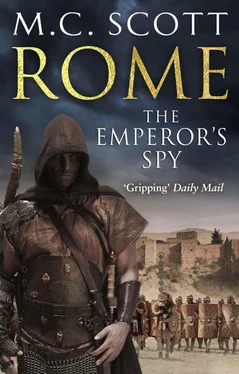M. Scott - Rome - The Emperor's spy
Здесь есть возможность читать онлайн «M. Scott - Rome - The Emperor's spy» весь текст электронной книги совершенно бесплатно (целиком полную версию без сокращений). В некоторых случаях можно слушать аудио, скачать через торрент в формате fb2 и присутствует краткое содержание. Жанр: Исторические приключения, на английском языке. Описание произведения, (предисловие) а так же отзывы посетителей доступны на портале библиотеки ЛибКат.
- Название:Rome: The Emperor's spy
- Автор:
- Жанр:
- Год:неизвестен
- ISBN:нет данных
- Рейтинг книги:3 / 5. Голосов: 1
-
Избранное:Добавить в избранное
- Отзывы:
-
Ваша оценка:
- 60
- 1
- 2
- 3
- 4
- 5
Rome: The Emperor's spy: краткое содержание, описание и аннотация
Предлагаем к чтению аннотацию, описание, краткое содержание или предисловие (зависит от того, что написал сам автор книги «Rome: The Emperor's spy»). Если вы не нашли необходимую информацию о книге — напишите в комментариях, мы постараемся отыскать её.
Rome: The Emperor's spy — читать онлайн бесплатно полную книгу (весь текст) целиком
Ниже представлен текст книги, разбитый по страницам. Система сохранения места последней прочитанной страницы, позволяет с удобством читать онлайн бесплатно книгу «Rome: The Emperor's spy», без необходимости каждый раз заново искать на чём Вы остановились. Поставьте закладку, и сможете в любой момент перейти на страницу, на которой закончили чтение.
Интервал:
Закладка:
The Sicari assassin came last of the line, guarding the rear. He did not turn his head, or pause, or give any other sign that he knew they were not alone.
Even so, as he passed Sebastos’ hiding place, he stooped to pick up a pebble. Without turning his head, he tossed it high in the air. It bounced precisely on the crown of Sebastos’ head.
It took all morning to leave the garden, so slowly did Sebastos move. No man saw him, not even his father, who had trained him to see all things that live, however careful they might be. He was better than his father; he was not sullied by the taint of falsehood and treachery.
Slowness gave him the peace to settle his unsettled heart, and to think. By the time he reached the hut, he had come to a decision. He was twelve years old, and had already made his first kill. He was not as tall as his mother had been; he did not take directly after the great Gaulish warriors who slew Romans in battle with their bare hands, but he was taller than most of his contemporaries, and could pass for a boy at least three years older. He was rich after a fashion; he owned the clothes he stood up in and a new belt he had not yet used, and a worn calfskin pouch that his mother had left him, containing three silver denarii that carried the head of the Emperor Tiberius. He debated taking his bow. There was no doubt that he could steal more food than he could ever shoot, but it mattered that when he presented himself to ask for employment, he should be armed, and so he lifted his bow from its hook, and his hunting knife and his six arrows, three of them fully fletched.
Taking these things — his youth, his height, his training as an almost-archer, and his riches of silver and weapons — he left the house of his treacherous father and set his face to Alexandria where he had once lived.
He had been happy there, but that was not the reason to return. Alexandria was where he had met the pallid Roman philosopher with connections to the emperor.
For two years, the man had come to watch Sebastos often as he practised with his bow, or spun his knife at distant targets. He had seen him fight — and sometimes beat — the other bastard get of soldiers who foraged in the scrap-camp that followed the legions. He had observed Sebastos’ solitary nature, his unwillingness to curry favour with those who scorned him, or feared him, or even the few who admired him. Most, the philosopher had seen that his own watching was noticed, and then that he himself was watched in his turn.
It had become an unspoken game between them; the philosopher would go about his business, always watchful, and Sebastos would try covertly to follow him.
Later, when the boy could go a whole day and know all of the philosopher’s business and never be spotted once, the man made the game official, and paid him in bronze, or bread, or fletchings, if he could follow a distant man, pointed out in a crowded place, and report on his activities.
Over three more years, the tests had become ever harder, ever more dangerous. Sebastos had excelled at all of them, and grown in his understanding of himself; shadows were his allies, secrecy his life’s blood, and the philosopher was a teacher in the truest sense of the word. When his father had been posted to Judaea and the child had been forced to follow, Sebastos found he had lost his first friend without ever having known he had one.
It had been a tearful farewell for both of them. At the last moment of parting, the philosopher had caught Sebastos’ chin and tilted his head and promised that if ever a tall, comely boy with skill in knife and bow wanted truly to be a warrior for Rome, he could promise him a wage and a place to live, and perhaps, if he made himself useful, citizenship.
Citizenship: the ultimate prize. Sebastos held the name of his potential sponsor in his heart all the long, dusty journey to Alexandria: Lucius Anaeus Seneca, teacher to a lost mongrel child.
I: Coriallum, Northern Gaul late summer, AD 63 in the reign of the Emperor Nero
Chapter One
The spy made landfall the evening before the chariot races began.
His ship sailed in on a narrow slide of sunlight, splitting the green-grey water from the blue-grey sky. The sails were already unstrung, alive in the snapping breeze. The berthing oars were out. Three pairs swept down either side of the wide beam, making of the Blue Mackerel a beetle, stalking into dock. A string of seagulls swayed over her wake.
She could have been any one of the sleek merchant sloops that flitted back and forth across the narrow stretch of sea from Britain to the small, crowded harbour at Coriallum on the northern coast of Gaul, but for the discreet purple pennant flying from the foremast that said she sailed on the emperor’s business.
At any other time, that might have been a lie contrived to increase the fares charged for passage, but not when Nero had honoured Coriallum with his presence for the chariot races, and was in temporary residence in the magistrate’s villa at the top of the hill.
As ever, the harbour was heaving with men, women, children, dogs and gulls, all watching the Mackerel come in. The furled dockside stench of old fish, fresh dog shit, rotting vegetables and seaweed was buried beneath the sweat of a hundred busy bodies.
Stevedores and fishermen leaned in pairs on bollards, picking their teeth, discussing the swell of the sea and the sharp iron taste of the air. Women balanced on either hip baskets of bread and dried figs and dried seaweed that blended their scents with the richer, rounder scent of the fresh wrack that hung from pillars beneath the pier. Old men coiled ropes and mended nets, bare-headed in the blustering wind. Half-naked children played games of tag, dodging round the legs of their elders.
A grubby urchin fishing from the pier’s end watched the adults covertly from the shelter of a wide-brimmed straw hat. As he did every day, he assessed the size and weight of their belt-pouches by sound alone, and then checked to see whether those of interest were armed, and what kinds of looks they threw him there at the pier’s end, if they chose to notice him at all. The boy-whores of Coriallum were notorious, but not everyone wished to be seen to be looking.
The boy’s name was Math, common enough amongst the Gauls. He paid the Mackerel no attention at all until the wake from her arrival slewed the mess of flotsam and jetsam floating up against the pier, upsetting the lie of his line. Then, he cursed, loudly enough to be heard, drew up his cord, set fresh collops of mussel on the half-dozen hooks and dropped it back into the water with a splash.
Tying it off, he leaned sideways against a mooring stone. Tilting his hat against the low afternoon sun, he allowed himself a lazy look at the men who had bought, or been given, passage on the emperor’s ship.
The first six ashore were Romans, green-faced and swaying on their sea legs, more bookish than bred to the sea. Ink stains on their fingers and the level cut of their hair gave them away as clerks in the governor’s retinue, sent with the endless quartermaster’s lists, of weapons, corn, hides, horses, men, hounds and slaves, and most particularly of the taxes with which Roman officialdom was obsessed.
Math felt the quality of their glances as they passed. On any other day, he might have considered making a play, but the clerks smelled of vomit and were clearly too ill to think of anything beyond an unswaying bed. None of them threw him a coin to pay for an ‘evening meal’.
To make sure they wouldn’t think of it, he squirmed his buttocks on the boards of the pier as if his arse itched, and then scratched urgently at his groin.
Ajax the charioteer had taught him that when they had first talked. There are men who will take you and not pay, however fast you might be with a knife. But if they think you’re infected, they’ll not come within an arm’s reach.
Читать дальшеИнтервал:
Закладка:
Похожие книги на «Rome: The Emperor's spy»
Представляем Вашему вниманию похожие книги на «Rome: The Emperor's spy» списком для выбора. Мы отобрали схожую по названию и смыслу литературу в надежде предоставить читателям больше вариантов отыскать новые, интересные, ещё непрочитанные произведения.
Обсуждение, отзывы о книге «Rome: The Emperor's spy» и просто собственные мнения читателей. Оставьте ваши комментарии, напишите, что Вы думаете о произведении, его смысле или главных героях. Укажите что конкретно понравилось, а что нет, и почему Вы так считаете.












